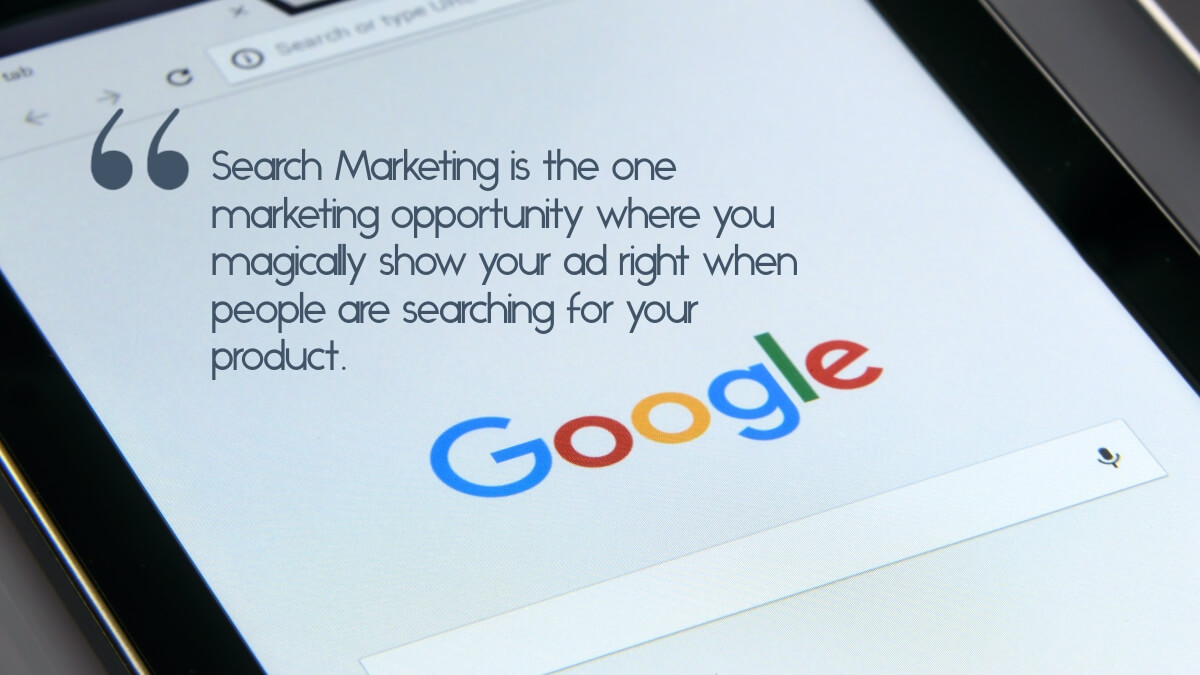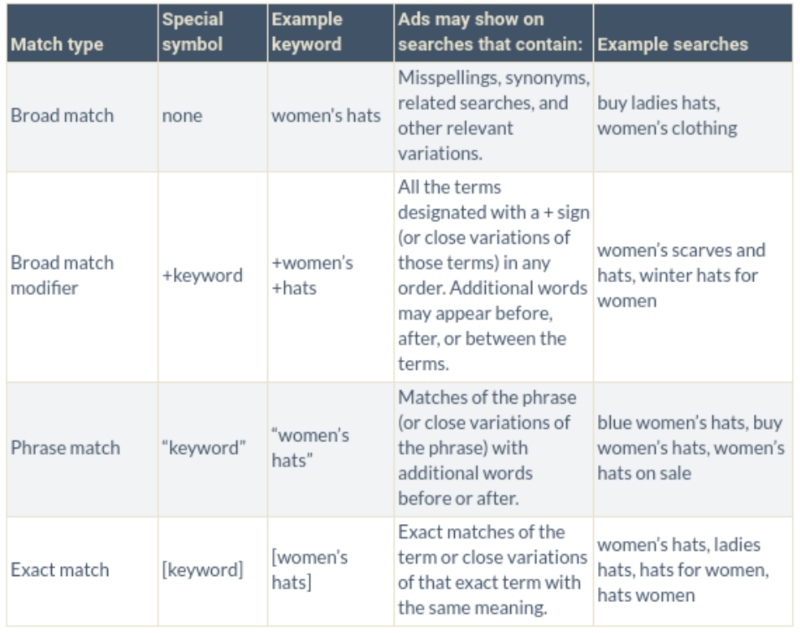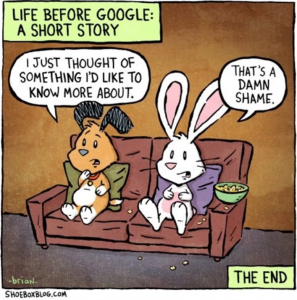Search marketing (SEM): when (and how) to use it… and when not to

We say it more than anything else: “you need search marketing”.
You sell watches online? You need search marketing. You are a kid’s dentist? You need search marketing. Again and again, search marketing (SEM) is the top of the list of Things We Say You Should Do.
First, let me quickly go over what search marketing is for those of you new to the term. Search Engine Marketing (specifically Google Ads or Bing Ads) is those ads that show up when you search for something on a search engine. Also called SEM, this is different than Search Engine Optimization (SEO) in that you are buying ads, not attempting to manipulate natural search results. You can tell the difference because there’s a little “Ad” graphic next to the result. You’ve seen them, of course. They look like this:
Unlike SEO, which is a long, complex, and somewhat arbitrary field ruled by the ever-changing algorithms that power Google and Bing, with Search Marketing you can get your search ad up at the top of the page by being smart about the terms you select, writing solid ads that point at relevant landing pages, and making sure you’ve got a competitive bidding strategy. We like things we can easily control when it comes to marketing. They tend to work best.
Frankly, search marketing works really, really well for most businesses. It’s one of the very few (only?) times when you get to show people your ad at the specific time they are looking for your product.
That’s pretty spectacular targeting.
Even better? You only pay for the ad if someone clicks on it, and you only spend what you want. Try asking a newspaper to only bill you if someone calls you from your print ad.
While there are a lot of nuances to putting together super fantastic search campaigns, there are basically three main things you need to worry about to get started:
1) Pick the right keywords.
Your search ad shows up when someone within your targeting parameters searches for one of the terms you’ve listed in your campaign, AND your bid is competitive (lots of factors go into bid pricing, so we’re not going to go into it here. Just reach out if you need help figuring this out). Your goal is to get your ad to show up on page one when, say, a busy mom searches for “kids dentist” and you have the search term “kids dentist” in your campaign.
One of the biggest keys to selecting the right keywords is putting yourself in the mindset of an ideal customer and figuring out what that person is likely to search for. I’m going to say that again: don’t select keywords that YOU think are important to your business. Instead, brainstorm keywords that your customer would think describe what you sell. Google will make suggestions for you, too, and that can help a lot.
A few words on keywords: There are all sorts of nuances and methods around how you set up your keyword lists that can result in the most effective keyword lists. Let’s assume for a minute that your business is The Ultimate Ladies Hat Emporium and you sell women’s hats. Here’s a little grid from Google that gives some examples of the different types of keywords you can set up:
You can use any combination of match types in your campaigns. There are some best practices around setting up campaigns and ad groups, but this is getting long as it is so we’ll leave that for another time.
Notice that results from Broad Match terms are, well, broad. Your term is womens’ hats, but you will also get results for women’s clothing, women’s gloves, women’s vitamins, men’s hats, hard hats, chef’s hats and so on. That’s not to say Broad Match is bad at all – but it’s worth giving plenty of thought to the possible results for the broad match terms you choose.
Negative Keywords
Once you get some results under your belt, you can also begin to start using Negative keywords to eliminate terms that are unrelated to your business but might be triggering ads. For instance, in our hypothetical Ladies Hat campaign, you may be a fashion merchant selling the latest and greatest cutting edge hats, but people may be finding you in paid searches for “Ladies Hard Hats”, and clicking on your ads, costing you money and eating up opportunities to reach customers who actually want what you sell. You can tell Google and Bing not to deliver ads for an exact term by setting it up as a Negative Exact Match term. (*Word of Warning: Negative match terms are very powerful and it’s possible to easily damage your business if you apply them incorrectly. If, for example, you selected “Hat” as a broad match negative term for The Ultimate Ladies Hat Emporium campaign, you would be telling Google you didn’t want the term “Hat” to show up in ANY searches. That would be bad indeed. So, be cautious.)
2) Write ads that work. (Duh.)
Google and Bing are both focused on delivering the best experience possible for their users, and so the best way to write “good ads” is to be accurate and as helpful as you can for someone who’s searching for your product. If you’re selling ladies hats, then make sure your ad talks about ladies hats, how you can help someone who’s searching for them, why YOU are the best place to find ladies hats, etc., etc., etc.
Simple, but not always easy.
Stay away from hype and exaggeration, just stick to the facts, and try running sales and discounts. Giving the customer some kind of reason to click on your ad (such as a sale) is ideal because Google and Bing only get paid when someone clicks on your ad, so they will reward you for ads that convert well by showing them more often!
3) Make sure your website link reflects your ad (and the keywords you’re targeting).
Back to the comment above, Google and Bing want to deliver great user experiences. If someone clicks on an ad for ladies’ hats and winds up on a landing page for fishing lures, that is NOT a great experience. Make sure your landing page (the page your ad links to on your website) is relevant to the ad. The search engines’ algorithms also take relevance into consideration in the bid calculation process… so the more relevant your landing page is to the keywords you’re targeting, the cheaper your bid will be, relatively speaking.
When to skip search marketing
All this sounds great, right? And it is. Search Marketing is awesome for almost every business. But not quite all. There aren’t many, but there are some businesses that don’t get good results from SEM. If, for instance, people don’t know your product or service exists (and therefore nobody’s going to search for it), then absolutely don’t bother with search marketing until you’ve built up more of a reputation. If you must do something, try a small campaign on your business name to make sure it shows up when people DO hear of you.
Also, if you’re in a highly competitive market, search marketing may seem prohibitively expensive based on what the competition is bidding for your terms. There are ways around that, such as doing a great job of optimizing your ads and landing pages, selecting lesser-searched long-tail terms, finding a niche market to attack, etc. But that’s a whole ‘nother post. And, trust us, most business owners starting up Google Adwords for the first time won’t have much luck working those angles.
Which brings me to the elephant in the corner. While the great thing about search marketing for small business is that it’s super effective and you can spend as little or as much as you want (different budgets will just get you fewer or more clicks to your website), the bad thing, of course, is (as you can probably tell by reading this) that it’s little more difficult to set up for the average person-on-the-street. Google does have a step-by-step process to get you started, which works to a certain extent, but my best advice is either train yourself a bit on the process—Google’s Adwords Courses are good for this—or hire someone (like, you know, us) to set you up with a simple program and teach you how to maintain it.
So, yeah, unlike throwing up a Facebook page and posting when the mood takes you, setting up Google Ads is a bit harder. But your hard work and/or investment pays off like almost nothing else. And while you work, just remember you have a significant advantage over businesses from the 80s:
Happy small business marketing!
Katie & Theron
At Urban Sherpa Marketing Co. we offer marketing advisory, strategic planning, and services for small businesses and startups, including content marketing. Our goal is to make high-quality marketing possible for every business, no matter the size. Think of us as your outsourced marketing department, strategic marketing adviser, or even your phone-a-friend marketing lifeline. We specialize in building efficient marketing programs to grow your business without blowing the bank.
Share this on:




